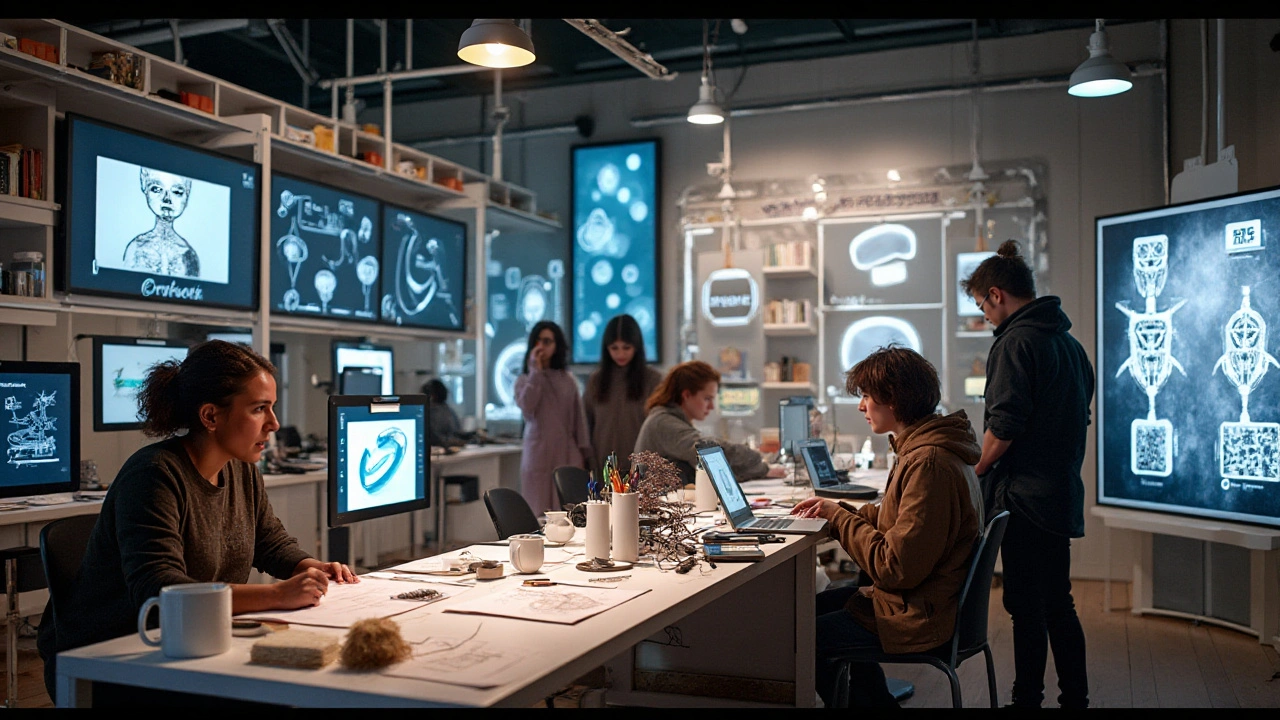Revolutionizing Innovation with AI Technologies

Artificial Intelligence isn't just a buzzword anymore; it has become a fundamental part of how innovation unfolds today. From healthcare to finance, this technology is transforming the landscape of every industry it touches. The possibilities seem endless, fueling both excitement and curiosity in equal measure.
Understanding the roots and growth of AI helps us appreciate how it has grown from science fiction to a tangible catalyst for change. But, it's not enough to just witness this growth; businesses need to understand how to harness AI's power effectively to stay ahead.
This article dives into the crux of AI's influence, exploring real-world applications and the intriguing potential AI holds for the future, while also shedding light on the ethical considerations that come with it.
- Understanding AI and Its Evolution
- Impact of AI on Various Industries
- How Businesses Can Utilize AI for Growth
- The Future and Ethical Considerations of AI
Understanding AI and Its Evolution
Artificial Intelligence, commonly referred to as AI, has undergone a remarkable journey from its inception to its current standing as a transformative technology. The seeds of AI were planted during the mid-20th century, when pioneers like Alan Turing and John McCarthy began to explore the possibility of creating machines capable of mimicking human intelligence. These early attempts laid the groundwork for the first practical AI programs in the 1950s and 1960s, which, although primitive by today's standards, set the foundational concepts that continue to guide the field.
The 1980s experienced what some call the AI winter, a period characterized by reduced funding and interest due to unmet expectations. Yet, this lull allowed for essential refinement in algorithms, leading to the resurgence of AI in the 1990s when more complex systems started to emerge. This era witnessed the development of machine learning and neural networks, which transformed how computers could process data and recognize patterns, setting the stage for the machine learning explosion of the 21st century.
A pivotal turning point for AI came with the integration of big data and cloud computing, which provided the vast amounts of information and computational power necessary for AI to evolve into its current form. Today, AI systems such as Google's AlphaGo, which defeated the world champion Go player, exemplify the capabilities of modern AI, combining deep learning with sophisticated algorithms. This progression showcases how AI is not merely a futuristic concept but an active participant in solving contemporary problems.
AI's journey is not only about technological enhancements; it also involves the ongoing philosophical challenge of understanding intelligence itself. In the words of Ray Kurzweil, a noted futurist, "Once a species becomes technologically fluent, it will undergo an intelligence explosion." This quote underscores the profound implications AI holds for future human development, suggesting that we are on the brink of unprecedented advancements that could redefine the essence of human and machine interaction.
One can only conclude that AI innovation continues to evolve, reshaping industries while pushing the boundaries of what we believed possible. As AI technologies advance, they'll likely foster even greater AI innovation in diverse fields, keeping the conversation alive and ever-evolving. But as we look forward, ethical questions arise, signaling the need for a thoughtful approach to ensure these technologies benefit humanity as a whole.

Impact of AI on Various Industries
Artificial Intelligence has become a transformative force across multiple sectors, reshaping traditional approaches and creating unprecedented opportunities for growth and innovation. In the healthcare industry, AI tools are being used to enhance diagnostic accuracy, streamline administrative processes, and personalize patient care. Algorithms are capable of analyzing vast datasets quickly, identifying patterns and anomalies that might escape the human eye, thereby facilitating early diagnosis of diseases such as cancer. This accelerates treatment processes and improves patient outcomes significantly.
The financial sector isn't far behind in adopting AI innovations. Financial institutions are utilizing AI to detect fraudulent activities, manage risk, and streamline customer service through chatbots and virtual assistants. AI-driven investment platforms are enabling more informed decision-making by analyzing market trends and customer behavior with an accuracy that was unattainable before. A study by McKinsey revealed that AI could unlock new productivity potential worth trillions of dollars by automating knowledge work within financial firms.
In manufacturing, AI is catalyzing a shift towards smart factories through predictive maintenance and optimization of production processes. By deploying AI algorithms, manufacturers can predict equipment failures before they occur, reducing downtime and maintenance costs. The integration of AI with the Internet of Things (IoT) further enhances this capability, enabling real-time data analysis and monitoring. An interesting application is in automotive manufacturing, where AI and robotics are used to improve assembly line efficiency and quality control.
Retail is undergoing a revolution driven by AI-powered recommendation systems and personalized marketing strategies. Retailers use AI to analyze customer preferences and purchasing behavior, tailoring marketing campaigns to individual consumers for a more personalized shopping experience. This not only increases customer satisfaction but also boosts sales. According to a PwC report, businesses can increase personalization and product recommendations by 20% through AI analytics, driving customer engagement and loyalty.
As AI continues to evolve, the ethical considerations around its deployment become more pressing. Industries must balance the benefits of AI innovation against potential privacy concerns and biases in data. Embracing a framework for ethical AI use is crucial for maintaining public trust while harnessing the technology’s full potential. Microsoft's Chief Counsel, Brad Smith, once said,
"The future will not be about man versus machine, but rather about man with machine working together."As Smith highlights, collaboration between human creativity and AI’s computational power is key to unlocking the next wave of industry revolution.

How Businesses Can Utilize AI for Growth
In today's fast-paced business environment, leveraging AI innovation is not just an option but a necessity for growth. Many companies are already using these advancements to optimize their operations, understand customers better, and create innovative products. AI systems can analyze vast datasets quickly, generating insights that were previously impossible to attain. This capability allows businesses to make informed decisions, tailoring their services and products to meet the evolving needs of their clientele.
One effective way businesses can harness AI is through enhancing customer interactions. For example, chatbots powered by AI can provide instant responses to customer inquiries, improving customer satisfaction and freeing up human resources for more complex tasks. This results not only in cost savings but also in the ability to serve customers 24/7, ensuring a seamless user experience at all times. According to a recent study, businesses that have implemented AI-driven customer service solutions have seen up to a 30% increase in productivity.
Artificial intelligence also plays a critical role in predictive analytics, where it helps predict future market trends based on existing data. By anticipating market shifts, businesses can stay ahead of the curve, adjusting strategies proactively rather than reactively. This strategic advantage can be crucial in industries with fierce competition, where staying one step ahead can mean the difference between success and failure. For instance, in retail, AI is used to forecast demand and manage inventory, ensuring that customers always find what they need when they need it.
"AI is not about man versus machine, it’s about finding ways for machines to enhance human capabilities." — Satya Nadella, CEO of Microsoft
Moreover, AI is opening new avenues for personalized marketing, allowing businesses to tailor adverts and recommendations to individual preferences, thereby enhancing conversions. By analyzing user behavior and preferences, AI can deliver a unique and personalized shopping experience, which has been shown to significantly boost customer loyalty and lifetime value. As businesses understand the unique characteristics of their audience better, they can craft more effective marketing messages that resonate with each segment of their customer base.
Integrating AI into the supply chain is another smart move, optimizing routes and logistics to save both time and money. AI solutions can monitor supply chain activities in real-time, providing invaluable insights into inefficiencies and areas for improvement. This capability ensures that businesses can not only streamline their operations but also maintain quality and adhere to regulatory standards. Companies that have embraced AI within their supply chains have reported up to a 20% reduction in operational costs.
While the potential applications of AI are vast, it is important for businesses to approach AI integration with a clear strategy and desired outcomes. Establishing specific goals and metrics to measure success ensures that the investments in AI yield tangible benefits. Business leaders must commit to continuous training and development to keep pace with the rapid advancements in AI technologies, thereby maintaining a culture of innovation that embraces change and fosters growth.

The Future and Ethical Considerations of AI
When considering the future of artificial intelligence, many immediate thoughts jump to mind, from hopes of unprecedented advancements to concerns about potential risks. AI's role in society is expanding, creating debates over privacy, autonomy, and morality. As we edge closer to a world where AI systems are an integral part of our decision-making processes, we must grapple with the ethical frameworks needed to guide their deployment. This involves understanding the balance between innovation and the moral responsibilities that come with such power.
Experts predict that AI will reach new heights in the coming decades. Imagine a world where AI technologies are not only assisting but taking the lead in complex surgeries, crafting intricate architectural designs, or even making nuanced legal judgments. The potential is vast, yet each application brings ethical questions. Who is accountable if an autonomous vehicle causes an accident? How do we maintain transparency when AI is involved in government surveillance? These are not just hypothetical questions but ones that require comprehensive frameworks and policies.
Ethical considerations aside, the future of AI promises astonishing technologies poised to transform various fields. In healthcare, for example, AI could soon predict pandemics before they spread or personalize medical treatment to a level previously imagined only in science fiction. Such innovations rely heavily on data, and with that comes the responsibility of maintaining privacy and ethical use of that data. Here's where regulations and guidelines play a significant role, ensuring that as we push forward with technology, we do not leave human rights in the dust.
In light of these advancements, there have been calls for responsible AI. Consider a quote from the distinguished technologist Tim Berners-Lee, who remarked,
"We need to think very carefully about what kind of society we want to build with AI, one in which machines set the rules or supplement human decisions with informed options."His insight underscores the importance of developing AI systems that augment human capabilities rather than replace them, emphasizing collaboration between man and machine.
Another critical aspect involves guiding principles for AI deployment. These principles should emphasize transparency, fairness in algorithmic processes, and accountability for outcomes. As AI systems become more ubiquitous, there is a pressing need for them to be explainable. Users, as well as the general public, should be able to understand how decisions are made, ensuring that AI applications align with societal values and individual rights.
Yet the promise of AI doesn't come without its challenges. Addressing bias within AI is paramount to ensuring fair and equitable outcomes. Machine learning models learn from historical data which might carry biases, hence responsible AI implementation must include rigorous testing and validation against such biases. As organizations integrate AI tools within their operations, they must pledge towards creating unbiased data inputs and outputs.
As we move into the future, the balance between innovation and ethical responsibility will be crucial. It's a tightrope walk between forging a brave new world and maintaining the core of human values. As the conversation around AI ethics heats up, adopting a global approach will be vital. Diverse international viewpoints can enrich the dialogue, leading to robust global standards that guide AI development beneficially for all.
The future of AI promises unimagined opportunities and challenges. The task now is ensuring that with each innovative step taken, ethical considerations are held at the forefront, fostering a world where AI empowers rather than controls humanity.